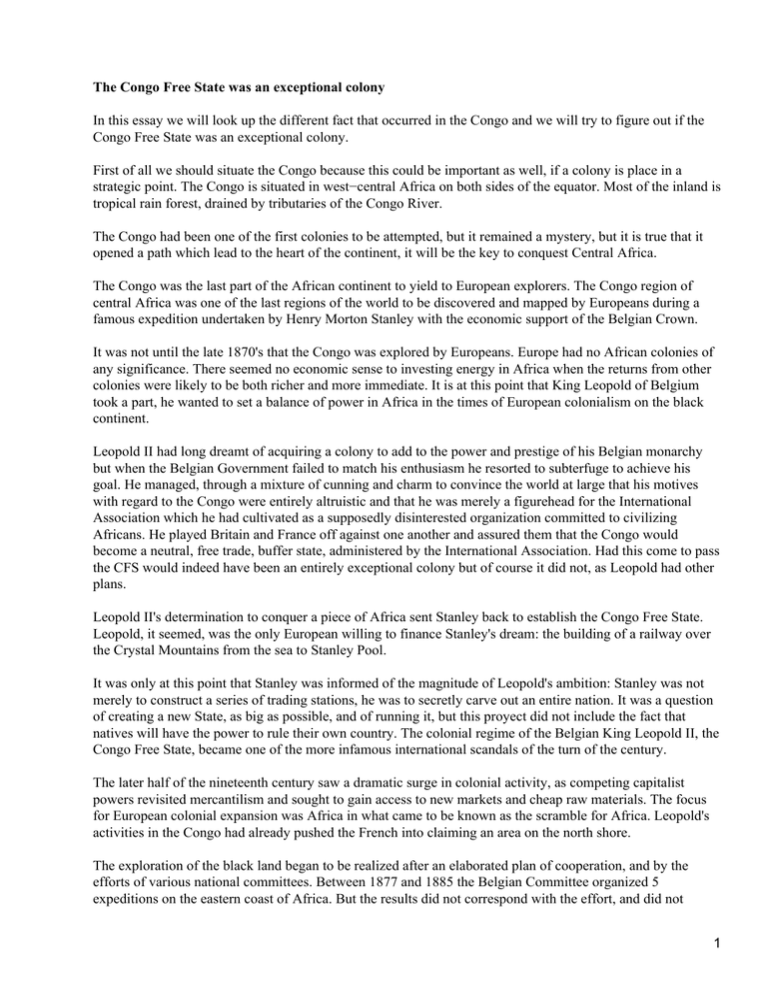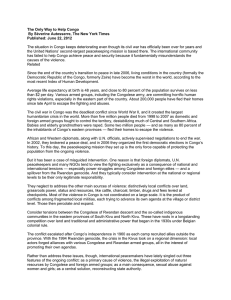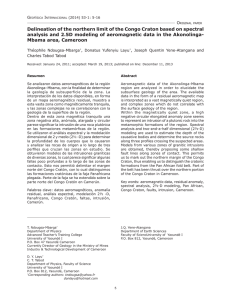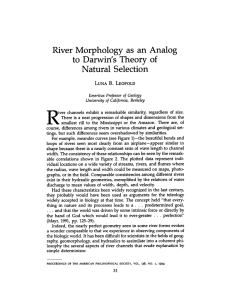The Congo Free State was an exceptional colony
Anuncio

The Congo Free State was an exceptional colony In this essay we will look up the different fact that occurred in the Congo and we will try to figure out if the Congo Free State was an exceptional colony. First of all we should situate the Congo because this could be important as well, if a colony is place in a strategic point. The Congo is situated in west−central Africa on both sides of the equator. Most of the inland is tropical rain forest, drained by tributaries of the Congo River. The Congo had been one of the first colonies to be attempted, but it remained a mystery, but it is true that it opened a path which lead to the heart of the continent, it will be the key to conquest Central Africa. The Congo was the last part of the African continent to yield to European explorers. The Congo region of central Africa was one of the last regions of the world to be discovered and mapped by Europeans during a famous expedition undertaken by Henry Morton Stanley with the economic support of the Belgian Crown. It was not until the late 1870's that the Congo was explored by Europeans. Europe had no African colonies of any significance. There seemed no economic sense to investing energy in Africa when the returns from other colonies were likely to be both richer and more immediate. It is at this point that King Leopold of Belgium took a part, he wanted to set a balance of power in Africa in the times of European colonialism on the black continent. Leopold II had long dreamt of acquiring a colony to add to the power and prestige of his Belgian monarchy but when the Belgian Government failed to match his enthusiasm he resorted to subterfuge to achieve his goal. He managed, through a mixture of cunning and charm to convince the world at large that his motives with regard to the Congo were entirely altruistic and that he was merely a figurehead for the International Association which he had cultivated as a supposedly disinterested organization committed to civilizing Africans. He played Britain and France off against one another and assured them that the Congo would become a neutral, free trade, buffer state, administered by the International Association. Had this come to pass the CFS would indeed have been an entirely exceptional colony but of course it did not, as Leopold had other plans. Leopold II's determination to conquer a piece of Africa sent Stanley back to establish the Congo Free State. Leopold, it seemed, was the only European willing to finance Stanley's dream: the building of a railway over the Crystal Mountains from the sea to Stanley Pool. It was only at this point that Stanley was informed of the magnitude of Leopold's ambition: Stanley was not merely to construct a series of trading stations, he was to secretly carve out an entire nation. It was a question of creating a new State, as big as possible, and of running it, but this proyect did not include the fact that natives will have the power to rule their own country. The colonial regime of the Belgian King Leopold II, the Congo Free State, became one of the more infamous international scandals of the turn of the century. The later half of the nineteenth century saw a dramatic surge in colonial activity, as competing capitalist powers revisited mercantilism and sought to gain access to new markets and cheap raw materials. The focus for European colonial expansion was Africa in what came to be known as the scramble for Africa. Leopold's activities in the Congo had already pushed the French into claiming an area on the north shore. The exploration of the black land began to be realized after an elaborated plan of cooperation, and by the efforts of various national committees. Between 1877 and 1885 the Belgian Committee organized 5 expeditions on the eastern coast of Africa. But the results did not correspond with the effort, and did not 1 compensate either the financial efforts sacrificed not the losses in human lives which these expeditions cost. Britain was uneasy at French expansion and had a technical claim on the Congo, but was reluctant to take on yet another expensive, unproductive colony. Portugal flirted with the French at first, but the British offered to support Portugal's claim to the entire Congo in return for a free trade agreement. Next Bismarck entered the fray on behalf of Germany: with vast new holdings in South−West Africa already, he had no desire for the Congo, but every intention of seeing that it did not go to either Britain or France. Leopold promised Bismarck that he would not give any one nation special status, and that German traders would be as welcome as any other. In 1885, Bismarck convened a 14−nation conference to find a peaceful resolution to the Congo crisis, the activities in the Congo Basin should be governed by certain principles, including freedom of trade and navigation, neutrality in the event of war, suppression of the slave traffic, and improvement of the condition of the indigenous population. After three months of negotiation, Leopold emerged triumphant. France was given 666,000 km² on the north bank, Portugal 909,000 km² to the south, and Leopold's owned 2,344,000 km², to be constituted as the Congo Free State. The Berlin Conference in 1885 recognized of the Independent State of the Congo. The Independent State of the Congo or the Congo Free State, was founded, and took its rank among the sovereign states. The conference recognized Leopold II as sovereign of the new state. This conference is importante because it demonstrates the desires that European countries had in the Congo, this might mean that the Congo had something they wanted and so they had to organise this conference to divide the colony. Leopold II proceeded to transform the Congo Free State into an effective instrument of colonial hegemony. Indigenous conscripts were promptly recruited into his nascent army, the Force Publique, manned by European officers. Leopold's overt policy was that stations set up throughout the territory by Sir Henry Stanley would be used to support religious missions, facilitate trade and military actions against the slave trade, thereby bettering and civilizing the Africans. This was a subterfuge which masked his covert policy of using the posts purely as tools to facilitate the extraction of the countries resources. The establishment of the Congo Free State partially had been legitimised with the intention to introduce civilization to the inhabitants regarded savages. Regarding the tasks of introducing civilization, as well as education and basic health care, missionaries of various confessions and organizations were instrumental. The Congo Free State became a victim of its ill−formation through nearly twenty−five years of autocratic mismanagement by its self−appointed king−sovereign, Leopold II, King of the Belgians and Sovereign of the Free State of the Congo. The costs for opening up the country, pacification and administration were immense. Among the problems to deal with were the establishment of an infrastructure, railway lines were constructed to circumvent not navigable tracts of the Congo river, at Matadi and at Stanley Falls. A State administration had to be established, with capital, a justice system etc. Leopold became sole ruler of 30 million people, without constitution, without international supervision, without ever having been to the Congo, and without more than a tiny handful of his subjects having heard of him. Leopold needed to extract riches from the Congo, not expend them. In flagrant violation of his mandate, he set out to do just that, and set in train the most brutal colonial regime in modern history. No−one knows how much Leopold made from the Congo Free State, but it was certainly more than even Leopold could spend. 2 Through Leopold II's domination the Congo Free State degenerated into a mismanaged quasi−colonial playground for the King. This rapid decline in the conditions and economic viability of the independent Free State led to the ultimate annexation of its territory to the Crown of Belgium. The Belgian Parliament forced Leopold to set up an independent commission of enquiry, and despite the King's desperate efforts, in 1905 it confirmed Casement's report in every damning detail. Leopold offered to reform his regime, but few took him seriously. All nations were now agreed that the King's rule must be ended as soon as possible, but no nation was willing to take on the responsibility, and never once was it suggested that that the land might be given back to the native population. Belgium was the obvious European candidate to run the Congo, but the Belgians were still unwilling. For two years Belgium debated the question and held fresh elections on the issue. Finally, on 1908, the Parliament of Belgium annexed the Congo Free State and took over its administration. However, the international scrutiny was no major loss to Leopold or the concessionary companies in the Belgian Congo. It was especially due to the activity and intelligent cooperation of Belgian agents and officers, investing a lot of their blood, their effort and their devotion to the royal enterprise, which built the work of Leopold II; they found little commerce going on, when they arrived. No one more than Belgium gave financial aid to the Congo Free State. The Congo Free State in the meantime faced grave financial difficulties. The rapid development of the African enterprise, the increasing costs of the young state made it necessary to find a direct financial assistance. In July 1890 the following convention was signed : the Belgian State granted the Congo Free State, a credit without interest, Belgium could annex the Congo Free State, with all its goods, rights and advantages attached to the sovereignty of that state, but also would take responsibility of the obligations of the State to others. The Belgian Congo is a historical survey of what was an African colony of Belguim with records of the worst colonial atrocities in Africa by Europeans and its horrific remnants. The Free State had declared all uncultivated lands state property, a part of which was administrated as state domain, a part of which was given out to private enterprises in form of concessions. Taxes were only payable in labour and were imposed to force the people to work for the state in what amounted to slave conditions. The natives were asked to also plant rubber vines so that future harvests could be secured. Abuse of labourers led to public outcry against the French colonialists as well as rebellions among the Congolese, but the exploitation of the native workers continued until 1930. Rubber was the single most important export product of the Congo Free State. The Free State became the world's leading exporter of rubber. Despite the huge income generated by the export of rubber, the Congo Free State was heavily indebted to Belgium. Along with the effects of resource depletion in the Congo, international commodity prices had fallen to a level that rendered Congolese extraction unprofitable. The state took over Leopold's private dominion and bailed out the company, but the rubber boom was already over. King Leopold died in 1909; the enclave was retransferred to Britain in 1910. The United Nations role in the Congo crisis between 1960 and 1964 saw its largest deployment of men and some of its most controversial actions. Until 1960, the Congo, as we have seen, had been a colony of Belgian but in 1960, Belgian announced that it was giving the Congo its independence. Belgian gave the Congo just five months to get itself ready for independence despite the fact that it was clearly unprepared for such a task. 3 The European powers justified their colonial endeavours by claiming that they were bringing civilization to Africa for the benefit of its people in the form of trade and investment but they all failed. They came to realize that any prospect of their newly acquired colonies providing new markets for their products required large−scale investment. 4


